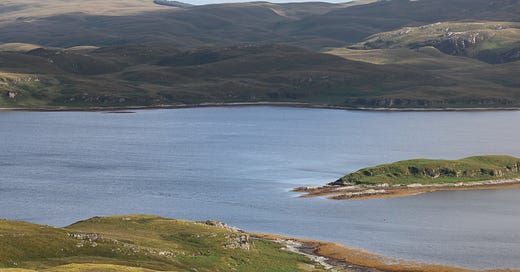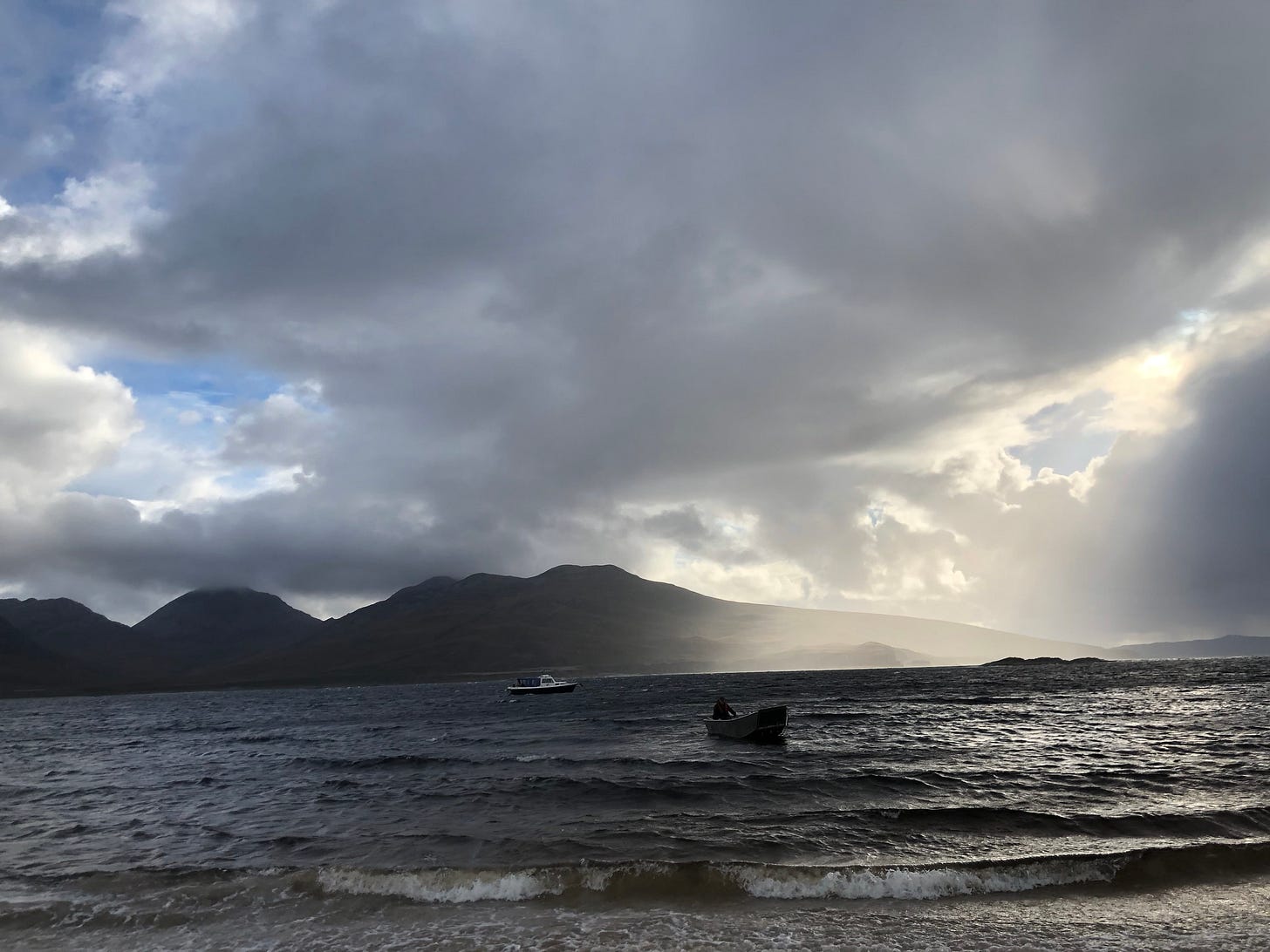Job No.1: tree-weeding. My first week promised to break me in with the job of slashing the bracken in the new wood. It was a sort of, ‘let’s put the new lad to the test by giving him the shittiest job’ kind of test of my durability. Or, from a less egocentric perspective, it was an important job which needed doing before the bracken died.
The wood had been planted the year before and the young trees required biannual weeding to help them compete with the bracken. What I was told would happen if I didn't cut it was that the bracken would die and fall on top of the young saplings, smothering and killing them. Back to the more egocentric perspective, couldn’t we just let the bracken die naturally and leave the buggers to deal with it themselves?
“Focking bastards,” was Dan’s usual grunt. This could be referring to the ticks, the midges, the bracken, the tussocks, or the gradient, the weather, the Tories, the Labour Party, or Greta Thunberg... or just his boots. Either way, it was more of a begrudging “right, let’s go” than a protest - unless it was about Greta.
Dan and I would tackle the bracken together when Ross only had one stalking party out that day. Sometimes I would do it on my own and sometimes with Greg. When it was me and Dan, we would cover every topic of intellectual curiosity with harmonious scepticism. We were always on the same page (page 101, Chapter 5: Ranting) but it was amazing how much depth he could go into on any subject. Truly inspirational. When I was on my own, I would more than compensate for his absence in verbal aggression. This wasn’t on account of picking up habits I realised, it was just because when I was with Dan, he somehow said it all - much better. This then, was just a natural, beautiful side of me. Had some one happened to walk past at the right moment, they may have been surprised to witness a swearing blur of steel blade and body parts flailing down the slope of a hill in an uncontrolled tumble through the bracken and small trees. Luckily, one of my few skills is identifying tree species, so I always knew exactly what type of tree I had just squished with my face.
After a long day, I’d rush home only to rush back out again with my fishing rod. Before long though, it began to feel like I was fishing for something which was only theoretically beneath the dark water. I’d start bargaining with the river for a deal: “give me one fish and I’ll sod off.” And when that didn’t work, “heeeere fishy fishies, here fishy fucks, heeeere you fishy C#*t$!…”. Before long I was a mumbling wreck, casting Gaelic curses on the river. Occasionally a fish would jump out right where I’d been casting my line for ten minutes in the sort of gesture you’d expect a Glaswegian scaffolder to give you if you blew him a kiss. After some research, I decided to try my luck at catching the fuckers in the dark. (A great idea.) This meant that I couldn’t see the river until I fell in it, at which point realising that I’d spent an evening dragging my line through grass.
Then came the long walk back, in the dark, falling in bogs whilst running from midges. “Honey, I’m home!” I’d shout with furious irony into the cold darkness of my empty cottage an hour later. Starving and exhausted, I’d open a tin of beans and drink them out the can. Then I’d put the pasta on to boil and sit down with a beer to wait impatiently for the mains. Washing up would have to wait till morning.
Sunrise had me climbing out of bed as fresh as a princess and frolicking down to the bay. I’d verbally abuse myself until I had the nerve to get into the water. Then, singing in soprano shrieks my head would go under. My routine was to paddle and dive for as long as I could bare in sharp circles, like a pale idiot pretending to be a duck. Having soon had enough, I’d get out, slithering up the sand like the kind of early amphibian which evolved into mammals and eventually, a pale idiot pretending to be a duck.
Breakfast was rushed so that I could do the washing up before work. Then a solemn oath would follow, promising never to leave the washing up for the morning. Today: ghilleying.
“Ross to Cod, do you read me? Over,” my radio burst on full volume, yanking my attention from my book.
“C-this-uh… this is Cod to Ross. Reading you, yep. [pause] - Over,” my focus was now sharp and keen but I was nervous.
“We’ve got a beast down a couple of kilometres nor-northwest below the Ruantallain ridge. I reckon ye’d be best doubling back to get down onto the Shian track. Then go between Loch Righ Meadhonach and Righ Mor to get onto the east side of the ridge. Over.”
I looked over my shoulder through the frame of the Argo Cat eight-wheeler hill machine to check out the particular expanse of hills and lochs I guessed he was referring to. All I had was a decent sense of north, south, east and west, a GCSE in French, and a can of beans… and the radio.
“Umm,” I wasn’t used to speaking like a soldier in a war movie, “Rodger that. Over.”
Silence. I suddenly felt more like a farcical pilot from the film Airplane than a Mark Wahlberg or Bradley Cooper character with a gun. I fired up the engine and set off in what I hoped was the right direction.
Though I had a radio and could ask for further instructions, I wanted to uphold the team’s professionalism in front of the clients, who would all be listening to my rookie voice through Ross’s radio as I asked him to repeat the instructions. Furthermore, I knew he would have already set off on another stalk, so I didn’t want to risk making a noise if it wasn’t completely necessary.
I found my way to the deer where it lay gralloched on the hill. It was a red stag. Approaching one of these animals on the hill felt a bit surreal. The deer on Jura are completely wild and will smell a person before they have a chance to see them. I’d never been so close to one. This one was about average for the stags we took off the hill. It was old and had begun to loose weight before going into the rut - the season where the males stop eating and begin to focus only on fighting for territory - so it would likely not survive the autumn and winter. Nonetheless, as it lay with all but its guts, it still weighed close to a hundred kilograms. Now I had to figure out how to lift it up a meter into the back of the machine. After a lot of shuffling around, with less dignity than what I hoped it had been allowed by its killer, the carcass crashed into the back of the machine. The heart lay amongst the guts and I picked it up, steaming and warm, and put it in a plastic bag to take home.
Two more stags followed in similar fashion. Finally, I was asked to meet the stalking party on the track and drive them back to the boat. The boat was moored (as seen above) with the Paps rising out of the sea behind it. I carried out my proceeding jobs: parking the machine, loading the stags and guests on to the small landing boat, raising the anchor of the main boat and making tea and coffee for the clients on the journey back. At last, we could drop the clients off at the lodge and do our last job of the day as a team: dressing the beasts. This meant driving them up to the shed and cutting off the private parts, legs, and head, and cleaning out the carcasses to hang in the fridge. All that was needed now was to put the rifles back in the gun room and have a chat over a dram.
A ‘wee dram’ in Scotland means any measure of whisky in a glass, and any number of glasses. If the day had been on the worse side of ‘fair’ - i.e., perpetual rain being driven horizontally by an oceanic westerly - a wee dram could be expected now. And there was no better place for it. Jura produces a world-famous whisky and the water, which is the same colour as the whisky on account of the peat, and is delicious enough to bottle and drink on its own, is extremely soft, allowing (they say) the oils of the whisky to mix with the water. But whisky-talk aside, it got me hooked.
As we shall see…





